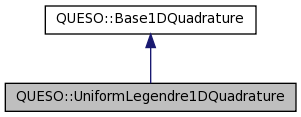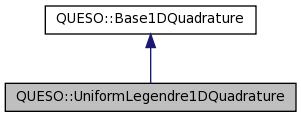Class for Legendre-Gauss quadrature rule for one-dimensional functions. More...
#include <1DQuadrature.h>


Public Member Functions | |
Constructor/Destructor methods | |
| UniformLegendre1DQuadrature (double minDomainValue, double maxDomainValue, unsigned int order, bool densityIsNormalized) | |
| Default constructor. More... | |
| ~UniformLegendre1DQuadrature () | |
| Destructor. More... | |
Mathematical methods | |
| void | dumbRoutine () const |
| A bogus method. More... | |
 Public Member Functions inherited from QUESO::Base1DQuadrature Public Member Functions inherited from QUESO::Base1DQuadrature | |
| Base1DQuadrature (double minDomainValue, double maxDomainValue, unsigned int order) | |
| Default constructor. More... | |
| virtual | ~Base1DQuadrature () |
| Virtual destructor. More... | |
| double | minDomainValue () const |
| Returns the minimum value of the domain of the (one-dimensional) function. More... | |
| double | maxDomainValue () const |
| Returns the maximum value of the domain of the (one-dimensional) function. More... | |
| unsigned int | order () const |
| Returns the order of the quadrature rule. More... | |
| const std::vector< double > & | positions () const |
| Array of the positions for the numerical integration. More... | |
| const std::vector< double > & | weights () const |
| Array of the weights used in the numerical integration. More... | |
Additional Inherited Members | |
 Protected Attributes inherited from QUESO::Base1DQuadrature Protected Attributes inherited from QUESO::Base1DQuadrature | |
| double | m_minDomainValue |
| double | m_maxDomainValue |
| unsigned int | m_order |
| std::vector< double > | m_positions |
| std::vector< double > | m_weights |
Detailed Description
Class for Legendre-Gauss quadrature rule for one-dimensional functions.
In a general Gaussian quadrature rule, an definite integral of  is first approximated over the interval [-1,1] by a polynomial approximable function
is first approximated over the interval [-1,1] by a polynomial approximable function  and a known weighting function
and a known weighting function  :
:
![\[\int_{-1}^1 f(x) \, dx = \int_{-1}^1 W(x) g(x) \, dx\]](form_50.png)
Those are then approximated by a sum of function values at specified points  multiplied by some weights
multiplied by some weights  :
:
![\[ \int_{-1}^1 W(x) g(x) \, dx \approx \sum_{i=1}^n w_i g(x_i) \]](form_53.png)
In the case of Gauss-Legendre quadrature, the weighting function  , so we can approximate an integral of
, so we can approximate an integral of  with:
with:
![\[ \int_{-1}^1 f(x)\,dx \approx \sum_{i=1}^n w_i f(x_i) \]](form_56.png)
The abscissas for quadrature order  are given by the roots of the Legendre polynomials
are given by the roots of the Legendre polynomials  , which occur symmetrically about 0. The weights are
, which occur symmetrically about 0. The weights are
![\[ w_i = \frac{2}{(1-x_i^2)[P'_n(x_i)]^2}=\frac{2(1-x_i^2)}{(n+1)^2[P_{n+1}(x_i)]^2} \]](form_58.png)
Several authors give a table of abscissas and weights:
 |  |  |
|---|---|---|
| 2 |  |  |
| 3 |  |  |
 |  | |
| 4 |  |  |
 |  | |
| 5 |  |  |
 |  | |
 |  |
- See Also
- Weisstein, Eric W. "Legendre-Gauss Quadrature." From MathWorld–A Wolfram Web Resource. http://mathworld.wolfram.com/Legendre-GaussQuadrature.html.
Definition at line 162 of file 1DQuadrature.h.
Constructor & Destructor Documentation
| QUESO::UniformLegendre1DQuadrature::UniformLegendre1DQuadrature | ( | double | minDomainValue, |
| double | maxDomainValue, | ||
| unsigned int | order, | ||
| bool | densityIsNormalized | ||
| ) |
Default constructor.
Constructs a Gaussian-Legendre quadrature of order order, in the interval [minDomainValue,maxDomainValue]. Valid values for the order of the quadrature rule are: 1-7, 10-12, 16. This method scales the abscissas (positions) of the quadrature from the interval [-1,1] to [minDomainValue,maxDomainValue], and the parameter densityIsNormalized determines whether the weights should be scaled as well.
Definition at line 118 of file 1DQuadrature.C.
References QUESO::Base1DQuadrature::m_maxDomainValue, QUESO::Base1DQuadrature::m_minDomainValue, QUESO::Base1DQuadrature::m_order, QUESO::Base1DQuadrature::m_positions, QUESO::Base1DQuadrature::m_weights, and queso_error_msg.
| QUESO::UniformLegendre1DQuadrature::~UniformLegendre1DQuadrature | ( | ) |
Member Function Documentation
|
virtual |
The documentation for this class was generated from the following files:
- src/misc/inc/1DQuadrature.h
- src/misc/src/1DQuadrature.C